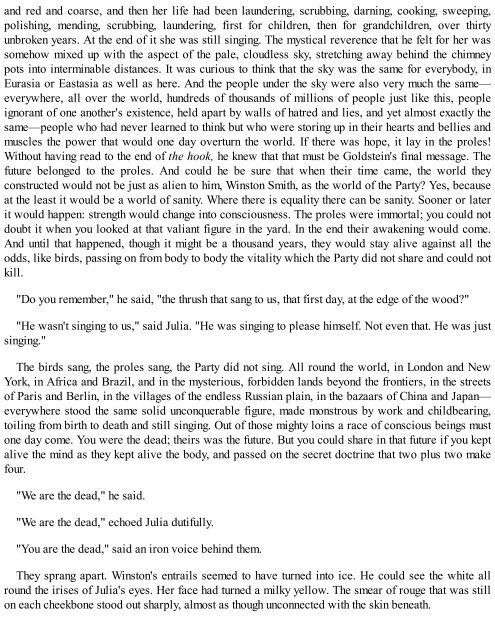Create successful ePaper yourself
Turn your PDF publications into a flip-book with our unique Google optimized e-Paper software.
and red and coarse, and then her life had been laundering, scrubbing, darning, cooking, sweeping,<br />
polishing, mending, scrubbing, laundering, first for children, then for grandchildren, over thirty<br />
unbroken years. At the end of it she was still singing. The mystical reverence that he felt for her was<br />
somehow mixed up with the aspect of the pale, cloudless sky, stretching away behind the chimney<br />
pots into interminable distances. It was curious to think that the sky was the same for everybody, in<br />
Eurasia or Eastasia as well as here. And the people under the sky were also very much the same—<br />
everywhere, all over the world, hundreds of thousands of millions of people just like this, people<br />
ignorant of one another's existence, held apart by walls of hatred and lies, and yet almost exactly the<br />
same—people who had never learned to think but who were storing up in their hearts and bellies and<br />
muscles the power that would one day overturn the world. If there was hope, it lay in the proles!<br />
Without having read to the end of the hook, he knew that that must be Goldstein's final message. The<br />
future belonged to the proles. And could he be sure that when their time came, the world they<br />
constructed would not be just as alien to him, Winston Smith, as the world of the Party? Yes, because<br />
at the least it would be a world of sanity. Where there is equality there can be sanity. Sooner or later<br />
it would happen: strength would change into consciousness. The proles were immortal; you could not<br />
doubt it when you looked at that valiant figure in the yard. In the end their awakening would come.<br />
And until that happened, though it might be a thousand years, they would stay alive against all the<br />
odds, like birds, passing on from body to body the vitality which the Party did not share and could not<br />
kill.<br />
"Do you remember," he said, "the thrush that sang to us, that first day, at the edge of the wood?"<br />
"He wasn't singing to us," said Julia. "He was singing to please himself. Not even that. He was just<br />
singing."<br />
The birds sang, the proles sang, the Party did not sing. All round the world, in London and New<br />
York, in Africa and Brazil, and in the mysterious, forbidden lands beyond the frontiers, in the streets<br />
of Paris and Berlin, in the villages of the endless Russian plain, in the bazaars of China and Japan—<br />
everywhere stood the same solid unconquerable figure, made monstrous by work and childbearing,<br />
toiling from birth to death and still singing. Out of those mighty loins a race of conscious beings must<br />
one day come. You were the dead; theirs was the future. But you could share in that future if you kept<br />
alive the mind as they kept alive the body, and passed on the secret doctrine that two plus two make<br />
four.<br />
"We are the dead," he said.<br />
"We are the dead," echoed Julia dutifully.<br />
"You are the dead," said an iron voice behind them.<br />
They sprang apart. Winston's entrails seemed to have turned into ice. He could see the white all<br />
round the irises of Julia's eyes. Her face had turned a milky yellow. The smear of rouge that was still<br />
on each cheekbone stood out sharply, almost as though unconnected with the skin beneath.









![Genki - An Integrated Course in Elementary Japanese II [Second Edition] (2011), WITH PDF BOOKMARKS!](https://img.yumpu.com/58322134/1/180x260/genki-an-integrated-course-in-elementary-japanese-ii-second-edition-2011-with-pdf-bookmarks.jpg?quality=85)
![Genki - An Integrated Course in Elementary Japanese I [Second Edition] (2011), WITH PDF BOOKMARKS!](https://img.yumpu.com/58322120/1/182x260/genki-an-integrated-course-in-elementary-japanese-i-second-edition-2011-with-pdf-bookmarks.jpg?quality=85)





